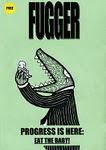Famed post-post-postmodernist
philosopher Dieter Schlemp had spent his entire career setting out to
prove various things in the hopes that he would fail to prove them.
He didn't like to be proven right. Dieter prided himself on his lack
of pride but he did not like to be proven wrong either. Right or wrong is such a dull paradigm. What Dieter liked was if the results
of his investigations presented something entirely unexpected and
bewildering. What Dieter ultimately wanted to prove, although he'd loath to admit that he wanted to prove anything, was that all enquiry was
folly and that reality was incomprehensible. Some may argue that
without enquiry our species never would have crawled from the sea and
mastered the land but Dieter reckoned that we were better
off under water. Dieter believed that the human experience was the
result of a profoundly boring cosmic mistake and the only thing that
interested him was to prove this, or not as the case may be.
Dieter's latest thesis argued that
people were more interested in talking about things happening than
things actually happening. For example, imagine you witnessed a UFO
landing in your garden but you could never tell anyone. Now imagine
you could tell everyone a UFO landed in your garden but such a thing
never happened. Which would you prefer? Dieter suspected that the
vast majority of people would choose the latter because what really
interested them was getting attention and being listened to and
valued. Most people would not say as much but, from what Dieter had
observed during his fifty five years on this planet, it was what they
really thought. People liked to talk above all other things, even if
it meant talking about nothing. In fact, as far as Dieter could make
out, the closer to nothing the subject was the more people liked to
discuss it. It was easy to have an opinion on something that barely
mattered at all. Things that did matter were a lot more trouble so
people tended to keep those things off the conversational menu. This,
for example, is why puff pieces about shoes get more column inches
than meditations on mortality.
After garnering the largest bursary
ever awarded to a humanities based academic investigation, Dieter
hired a large PR firm to create a commotion concerning lichen. Dieter
instructed the PR company to get the media talking about lichen more
than it talked about red carpet events. What Dieter wanted to do was
make the spreading of lichen and the patterns made by lichen and
other phenomena particular to lichen water cooler moments. #Lichen
trending like a boss for at least three weeks was what Dieter wanted
and that's what he got when the PR company arranged for Kanye West to
pose for photographs with some lichen and share his opinions on
lichen. 'Lichen just be chillin and shit' said Kanye of the lichen.
Then the PR company manufactured stories about sick children whose
last wish was to stroke some lichen as well as stories about how
lichen stroking was being used to treat PTSD and fight the signs of
aging. 'For too long we have taken lichen for granted', said an op-ed
piece by a popular columnist who genuinely believed that he was writing
his own thoughts. Almost everyone agreed with the columnist and even
those that didn't were still talking about lichen when they expressed
their opinion and therefore maintaining its 'trending' status. Pixar
then made an animated film about lichen that was voiced by Kaley
Cuoco and Donald Sutherland. An awareness campaign about lichen
sclerosus was also launched and everyone bought anti-inflammatory
ointments and smeared them on their genitals. 'I'm so glad people are
finally talking about this', said one daytime TV host who did not
suffer from the condition or know anyone who did.
So, Dieter's thesis was proved correct.
People liked to talk, no matter what the topic and the blander the
topic the more they liked to talk about it. Dieter was, of course,
miserable to be proven correct and moped around the house irritating
his wife, Annabelle, for weeks afterwards. Being proven wrong would
have been just as bad for Dieter. 'What did you expect to happen?',
Annabelle asked him. 'Something new, something different', said
Dieter dolefully, 'something bloody interesting'. Annabelle knew her
husband well and lifted his spirits when she posited that something
interesting had indeed happened. 'Isn't it interesting that people
can be interested in something so uninteresting?' she asked
rhetorically. Then she delivered her stroke of mercy, 'why is that,
do you think?' she asked non-rhetorically and with fake nonchalance.
Annabelle then watched as the spark of enquiry once again grew in
Dieter's dying eyes and she knew that he would soon be off on another
folly. Dieter would never realise what Annabelle had done for him and
Annabelle knew that he would never realise it but that didn't matter
to Annabelle. She too prided herself on her lack of pride and, really,
she was just glad to get him out of the house.



No comments:
Post a Comment